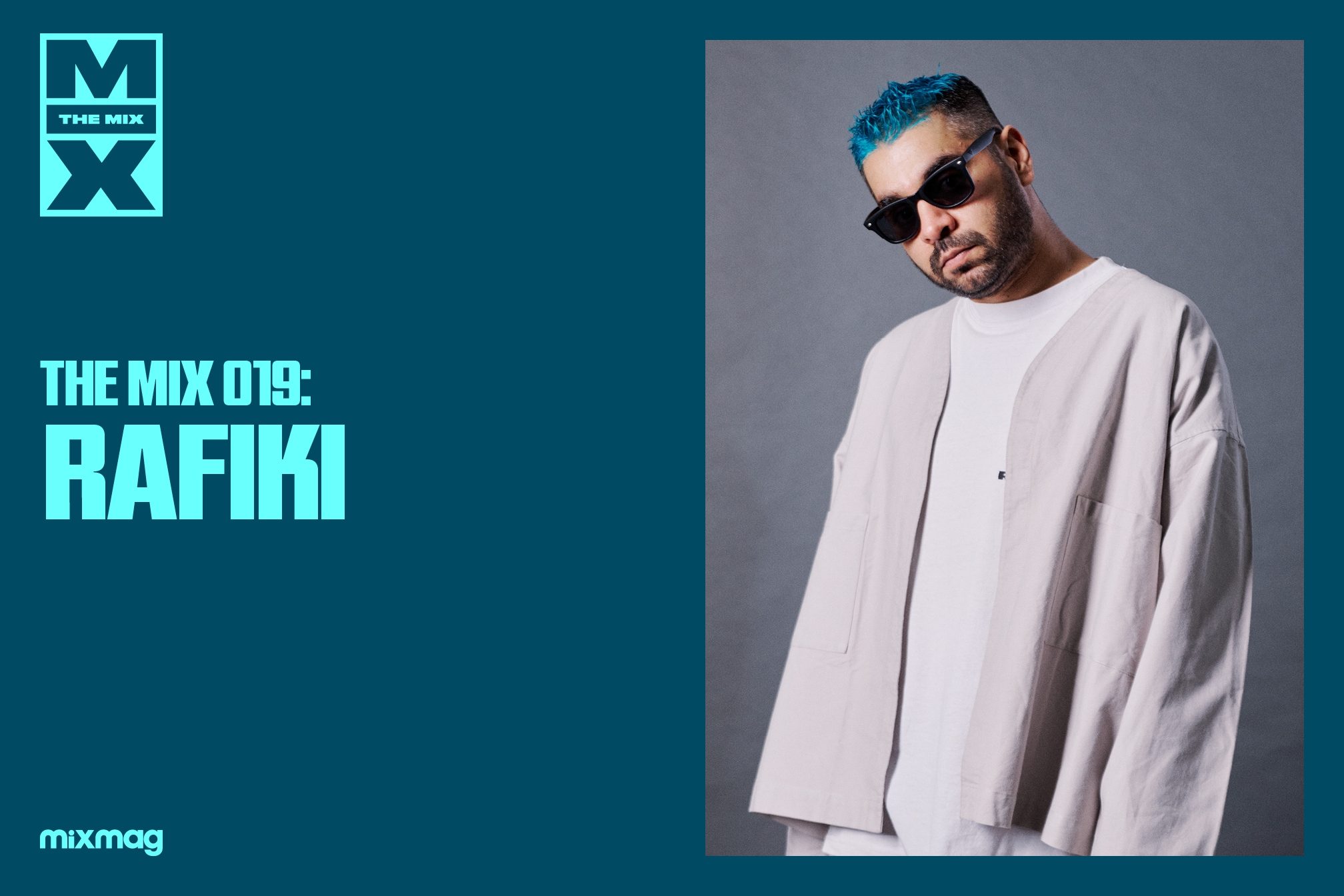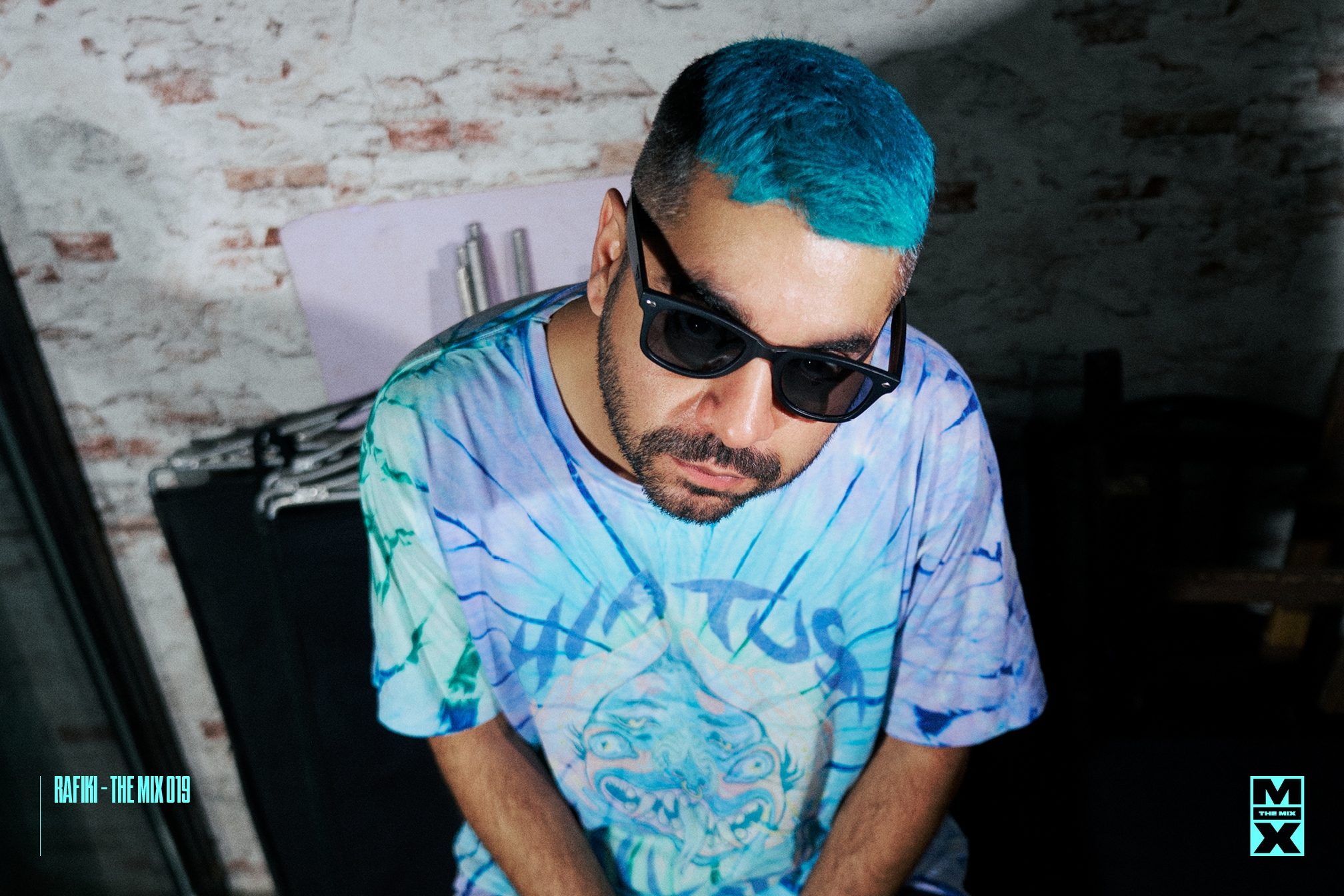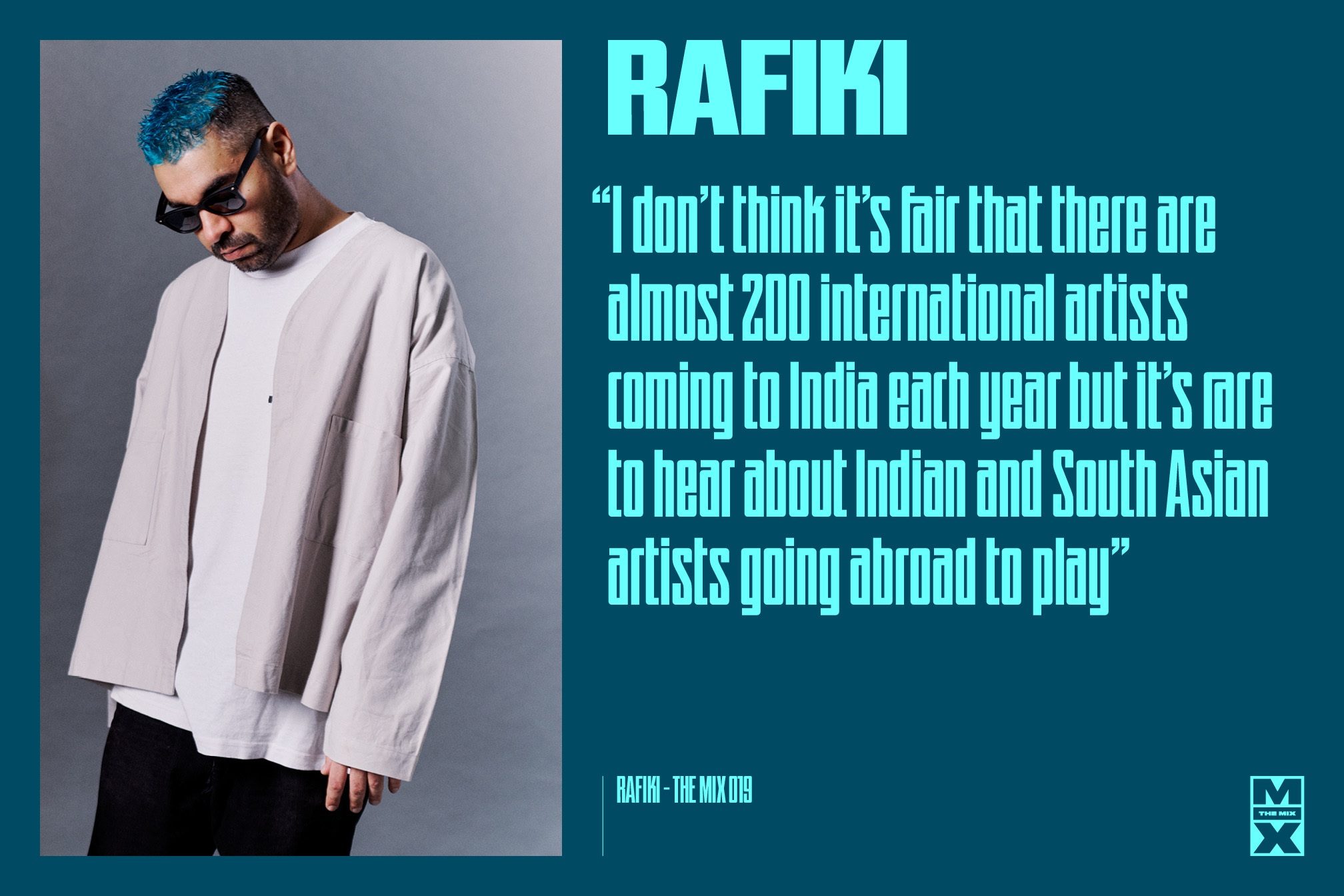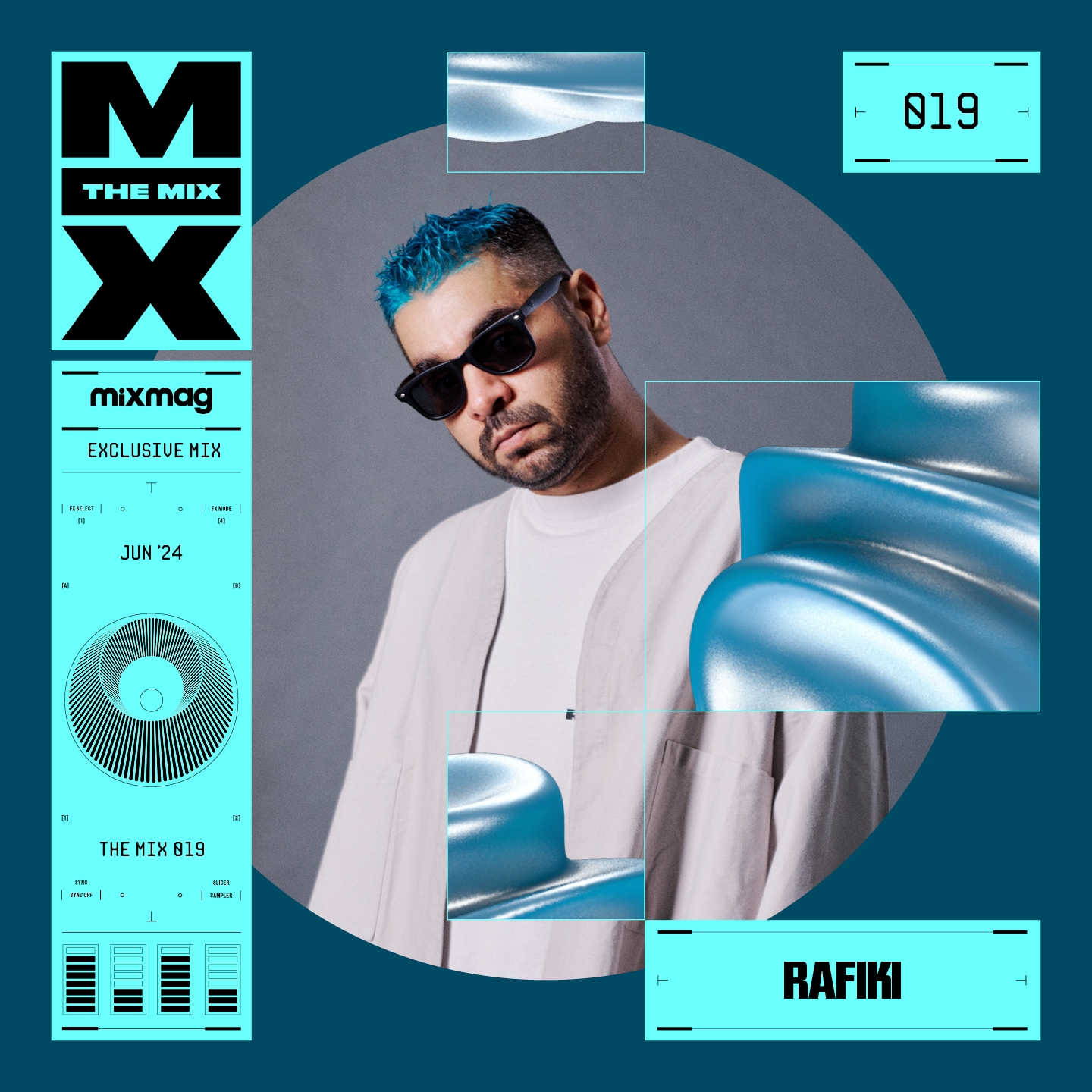 Music
Music
The Mix 019: Rafiki
Mumbai's foremost electro-charged chameleon showcases some primo house and techno with a dash of signature bass, and speaks to Aneesa Ahmed about his rock music origins, transitioning away from bass and how the West should do more to uplift Indian artists
A jack of all trades who is on track to master them all, Sohail Arora - commonly known by one of his aliases Rafiki - is most comfortable when utilising his creativity and embracing new styles. From his base in Mumbai, this DJ, producer, label head and events curator has managed some eye-watering feats; opening for The Prodigy, putting on a Boiler Room showcase with his events company Krunk — and now, championing electronic sounds from across the Indian sub-continent.
The 39-year-old began his Rafiki alias in 2017 to explore house, techno and electro-heavy sounds within his DJing and production. “I feel like you shouldn’t have strict rules in life about what you like and what you don’t,” he tells Mixmag. “It’s constantly evolving. For me, I feel like musical evolution happens every five to 10 years. I’m always looking for something new and something fresh.”
Yet his first plunge into the dance music world was in the late noughties, through his drum ‘n’ bass alias EZ Riser - which he still keeps now for when he feels like hopping behind the decks for the junglists of the world - “I played Secret Garden Party last year with that alias” he reminisces.
Although he was producing during this drum ‘n’ bass period and released an EP with his bass-music-focused collective Bay Beat Collective (BBC) titled ‘Megapolis’ back in 2012 - he took a break from producing until 2019 and now makes music as Rafiki. “I have a really addictive personality. So producing has become my addiction. Even with a busy schedule I open a project for at least an hour or two every day and work on it and I still have so much to learn.”
Read this next: A deep dive into South Asian electronic music
His 2023 EP ‘New Shifts’ was released on his own imprint, Krunk Kulture. Though for his most recent project, ‘Anand Mahal’ - which came out in May - he selected the German label Permanent Vacation, an imprint he had been inspired by "for years." The not-so-dance-heavy, electronic EP is named after his house in Mumbai: “[Anand Mahal] has been a centre for jams, social get-togethers & a lot of artists dropping by. A lot has happened here. So this place is special, all the songs all mean something. ‘Anand Mahal’ also means ‘happy palace’ in English.”
We caught up with Sohail Arora to talk about his musical beginnings, the birth of Rafiki, drum ‘n’ bass vs techno, mental health, and how the West can do more to support artists in the Indian subcontinent.

What were your musical beginnings - when did you first discover music and that you had a serious passion for it?
Mumbai, which used to be known as Bombay, is my home. In college here I was making playlists and CDs and selling custom CDs — it was that process that made me realise that making music was what I wanted to do full-time. In college, I studied computer science engineering but after the first year I realised I didn’t want to do that any more — so I parallely started to try and get into music journalism. I was writing for magazines such as Rolling Stone India and that gave me the perfect grounding and network in the music scene.
So college was a big moment of self-discovery for you?
I was in a band in college, we covered Deftones, Slipknot, Limp Bizkit and that type of heavier music. I would scream, growl, sing. I did all that! Our band was a big part of my life. The biggest college festival in India is called Mood Indigo and there would be like 60-80 bands competing to be in the top three and my band was in the top three for two years in a row. We played the final in front of 10,000 people in 2005/2006 — which was quite an experience. My rock music roots influenced my passion for music. Living the rockstar phase was a fun one. But eventually, I started to lose the aggression and began listening to dance music. I didn’t want to scream anymore. However, I respect my friends from the metal scene — metalheads are the happiest people, because of the energy released through the music! Loads of the metalheads I know are some of the sweetest nicest people, whereas people working in the electronic music industry are not so nice overall.
Haha! But then how did you transition from growly rock music to liking more electronic styles?
If you ask lots of dance music heads, there is a lot of connection between these worlds. But it felt like a massive transformation for me. In 2006 I went to this place called Zenzi [in Bandra, Mumbai], and it was this cultural hub that played really cool music. I was coming out of engineering college and listening to lots of metal so listening to this type of music was overwhelming but it was also life-changing. I already wanted to be a DJ, and I knew the owner of Zenzi through my mate and fellow DJ, Raffael Kably who wrote for one of the same magazines as me at that time, I asked if I could come and practise on their decks. So they said I could practice on Mondays and I started to put on a breakbeat and drum ‘n’ bass night on Monday nights with my mate Raffael Kably. Six months down the line there would be 60-80 people showing up for our party and it became a thing. My fee back then was like a ‘China Box’ [Chinese takeaway box] and two beers - nothing else. This was a time when CDJs didn’t have a jog box - so it was a very different time to learn to DJ. But this was the start of what changed me to start a music career full-time. And now I’ve been doing it for 18 years.
How long did the bass and breaks era of your life last?
So I met the resident DJ at Zenzi called Kris Correya and then me, him and Raffael formed a three-person crew Bay Beat Collective (BBC) in 2008. We were one of India’s first bass music crews. We played for four to five years together. We opened for The Prodigy, we did gigs with London Elektricity, Pendulum, Alix Perez etc. We were very lucky to be at the forefront of the bass music movement from 2008-2013 in India.
What other artists were you listening to when you were making this name for yourself?
I listened to a lot of Four Tet and Bonobo's early work. I also listened to a little bit of house and techno as well, mostly from a German label called BPitch Control. I’ll admit, for a long time I was a bit anti-techno and was a die-hard bass head. I’d do the stereotypical "my music is better than your music," — although, over time, I did listen to more electronic genres and fell in love with house and techno music eventually.
How did you break away from your bass collective and begin Rafiki?
In 2017 I started Rafiki. I went to Dekmantel and Panorama Bar and my life changed. It opened me up to this world, I was in the right place at the right time and experienced it with the right people. I surrendered to the moment and challenged my own ideas about these genres. The Rafiki alias has been my biggest focus for the past six years, but I always want to keep my broken beat influence in my production.
How did the name Rafiki come up and what inspired you to create a new alias to experiment with new styles?
Well, Rafiki is obviously the wise character from The Lion King... it’s nothing too deep. A close friend suggested the name to me and it also means "friend" in Swahili — but I didn’t realise there were so many Rafikis on Spotify when I took it, but I stuck with it anyway! I like it, it's a good name. I feel like the world of jungle, drum ‘n’ bass, and bass music culture were so different from the audiences in the house and techno world. Yes, there is a crossover, but if you go to fabric for a drum ‘n’ bass night you’re not going to see any house music guys there. So these are separate worlds. Dekmantel and Outlook have very different crowds too. Hence I decided to start a new project, Rafiki and kept EZ Riser separate. I wanted to do justice to each world and separate them. Although I like having different aliases because I can dip in and out of genres.

Why did you want to create your label Krunk Kulture in 2020?
There was a gap in the market to showcase Indian electronic music talent. Some small labels do specific sounds but I wanted a label to showcase the different styles of electronic music coming out of the country and to platform cutting-edge sound. Lockdown gave me the perfect opportunity, and I was thinking about starting a label for ages. This whole time while I was exploring my sound in both the bass sphere and the techno and house sphere — I was running an events organisation called Krunk since 2009. So that’s the parent company, we do events and artist management. But no one spoke about us or wrote about us until 2021, it was the label that helped the Krunk brand get recognised. We got noticed worldwide. From 2009 to 2020 Krunk has hosted over 400+ international artists in India. Out of which at least 50% were UK acts - but no one knew about us. So the label was our outlet to say we exist, and there is a scene and lots of talent in India. Listen to us.
How is it going at Krunk Kulture right now?
What’s happening in the world, and all the ongoing conflict [in Gaza], is taking over our mindsets and our mood in the workplace. It’s been really difficult, we’ve had to pause some of our output and promotions today because it didn’t feel right. I’ve delayed some promotions of my music too, that’s the vibe right now. I hope for peace in Gaza
I was at a Daytimers event last weekend and we spoke about how as South Asians we feel a greater need to raise awareness and take action, and it can impact how we do things that are supposed to be "fun."
Definitely. It is a challenge. But, it's important for creatives and artists to use art at this time to create more awareness and talk about the genocide that's taking place. I will work on doing the same with my time. But we just have to see and take every day as it comes.
What else have you learned in the process of running a label?
It’s not easy running a label. We’ve broken even on maybe five out of 20 releases. Streaming is changing everything - but we’re in a better place than we were in 2020. Interestingly we found that dance music doesn’t do as well on the streaming platforms, but chill music does. However, in India we don’t have the infrastructure to support smaller artists on these platforms. In the UK there are lots of editorial playlists at Spotify or Apple Music which can sometimes boost listening for smaller artists, but very little exists here for electronic music. We’re very happy with the content we’re putting out, and I get to work with some amazing artists. Krunk [the events company] makes the money, while the label is the passion project and we do lots of festivals, events & artist management under Krunk. The label is our outlet and a way for us to creatively express ourselves - I don’t want to put too much financial pressure on it because it feels so pure.
Do you think that the global dance music community, especially from the South Asian diaspora, can do more to support artists from the Indian sub-continent?
Yes. I don’t want to point fingers but I don’t think it’s fair that there are almost 200 + international artists coming to India each year but it’s rare to hear about Indian and South Asian artists going abroad to play. Often it’s at their own expense, no one is really funding them. I saw Dialled In is doing a Boxout FM showcase which is good. But we need more opportunities. I write to a lot of people and try to book a lot of my artists. I don’t think South Asian electronic music is reaching as far as it could - apart from a few exceptions such as the likes of Arjun Vagale, Sandunes, Ritviz and a few more. We have to work extremely hard just to get a few opportunities, while we’re a very open country and we welcome people with open arms. So there is a lot to happen from the West.
How have your own recent adventures back into music production been?
It’s actually been really good for me, it has helped me deal with depression and tough times. It’s helped me heal. Music is the biggest healer I have, more than therapy. One of the EPs I put out last year, ‘New Shifts’, is a journey of me recovering from a breakup and other stuff. I tracked how the songs on the EP changed month-on-month with my therapist which was really interesting. I found in difficult times I write more meaningful music, so I’m enjoying all of that and exploring that.
Your new single ‘Black Smoke’ with Tara Lily, how did that come about and why did you collaborate with her?
When I met Tara, Me and Tara already realised we had lots in common. We faced similar things in London and Bombay, respectively. She was on tour and shooting a music video in India and we had the chance to connect and she felt like she could add something to this track. The instrumental I’ve had in the works for a while, originally I was maybe going to collaborate with a different vocalist but it just didn’t work out. I was confident Tara was a special artist - she took her time with the track and understood how dance music vocals really work - because she had done mostly jazz before. It was really cool and was a learning experience for me too because I hadn’t worked much with vocals in that much detail before. This experience has made me a lot more confident with collaborations. I want to collaborate more now. It takes vulnerability to work with someone creatively. So this was an important song for me to give me this push.
Read this next: World's first electronic tabla launches in Mumbai, Tabla Touch
What was putting on the Krunk Boiler Room showcase like?
It was great, and the Boiler Room crew I worked with was amazing. We created a line-up of Krunk acts, friends and artists who deserve to be showcased from our community. Boiler Room is Boiler Room, it has its perks of helping you elevate your career. But it’s very daunting too, and if you make a couple of mistakes then it will bother you for the rest of your life! I actually got a stye in one of my eyes so I had a shut eye in the week of Boiler Room. So I wear shades, which is fine but with one eye shut but it was an interesting experience.
Do you ever plan ahead for gigs?
It really depends. If it’s a serious gig or if people are going to be peaking, you know, I want to have a thought-out set so there’s a bit of planning there. Even if the mixes aren’t planned I have a rough idea of what I’d want to hear in those times. Most DJs will know, you have to know the music inside and out. But if it is a regular club show then actually I don’t prepare much at all.
What hat have been some of your favourite places, events or festivals that you’ve DJed at?
I’ll start with Bombay - there was this event called Room 303. That was amazing and it was in a 180-year-old Great Eastern Mills, one of Mumbai’s last surviving textile mills - and wanted to bring a warehouse feel to the city. I love playing at antiSOCIAL and Bonobo (my two homes). Last summer I took Rafiki on a European tour, Brussels and Oslo were really special. I also often play in Sri Lanka and have done some incredible parties there, I also love playing in Goa. A lot of my community from Bombay have moved to Goa. And yeah, even though, over the years I’ve played in a bunch of really cool places, Bombay will always be one of my favourite cities. There is something about the energy in Mumbai (Bombay). It is really special.
What’s next for you?
I want to make a really nice studio space for myself this year. My current studio is not great, so I'd like to improve it. I would like to focus on doing quality gigs. I’m getting older now, so I can’t really do back-to-back shows every weekend like I did in my 20s, so instead I want to play only quality shows now. I’d love to build my project and name in the European and Asian markets. We’re actually trying to build an Asian ecosystem and get a touring circuit going and flowing between different countries in Asia, rather than only relying on Europe/UK/America to make a name. I see Asia becoming a massive phenomenon in the next five years. I’m touring South-East Asia in the autumn and I'm pretty excited about that prospect.
Tell us about this mix.
The Mix features a lot of my released and unreleased music. It also features some of my fave labels and artists I'm listening to at present and playing across dancefloors. It perfectly showcases my love for house/techno /electro/electronica and broken beat. It also features a couple of tracks from my new EP 'Anand Mahal' and a bunch of other releases from the label, Permanent Vacation (that released Anand Mahal).
Aneesa Ahmed is a freelance journalist, follow her on Twitter

Tracklist:
Rafiki - Black Smoke
Felipe Gordon - Travel Through Your Mind
Rafiki - Khulle Darwaze
Delay Grounds - Link in bio (Radio Mix)
Stefano Ritteri - We all are one
Wolfram - A thing called love
Rafiki - Directions (unreleased)
Shantam - OP House
Rafiki - 5 AM Dub
Crush hour - Midas
Sidney Charles - No Way Out
Ruze - Repetition
Baldo - Not Just Physical
Jesse Jacob - Roll on
Ninetree - Oonya
Louden - Freaky Jam
Jhojho - Killerman
Farsight - Fool Me
Sprennner - Catch Me Now
Dauwd - Slam
Tommy Phillips - Smokin
Vampire Sex - Disco Party Baby
Rafiki - Nu Funk
Rafiki - Tak Dhin Dub (Unreleased)
Revivis - Ruminating Tiptoes - Chip Shop Heroes (Sidney Charles Remix)
Benjamin Frohlich - Do You Wanna Dance (Baldo Remix)
Shantam - Deeda
Sam Townend - Perfect Day
Revivis - Pick me up ROOLEH - Look at That
Jamback - FEEL THE MUSIC
Baldo - Ride The Night


